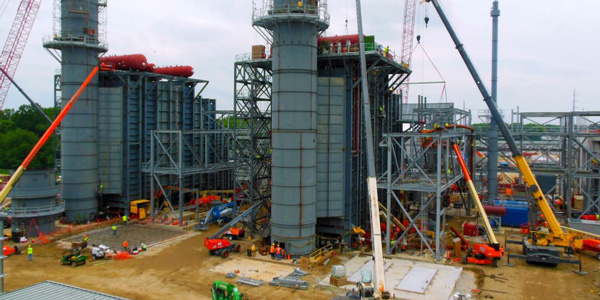By Rich Heidorn Jr.
The D.C. Circuit Court of Appeals on Friday backed FERC in its revised interpretation of a PJM Tariff provision governing responsibility for transmission upgrades, turning aside a challenge by the owner of a power plant in Marcus Hook, Pa. (ESI Energy v. FERC, 16-1342).
At issue was whether LS Power Associates, the parent of West Deptford Energy, should be liable for transmission upgrades ordered before the developer entered PJM’s interconnection queue. In 2014, the court vacated FERC’s order ruling the company was liable, calling the commission’s decision “the very essence of unreasoned and arbitrary decision-making.” (See Appeals Court Scolds FERC over West Deptford Interconnection Dispute.)
West Deptford submitted its interconnection request on July 31, 2006, and was later informed it would be assessed $10 million for improvements PJM ordered as a result of two previous projects, FPL Energy Marcus Hook and Liberty Electric.
Tariff Change
Under section 37.7 of the PJM Tariff then in effect, the RTO could seek reimbursement for a previously constructed network upgrade if the new proposed project used the added capacity created by the project or would have required it itself. The reimbursement request only applied if the cost of the upgrade was at least $10 million and it was placed in service no more than five years before the interconnection customer’s queue closing date.
If section 37.7 controlled, West Deptford would have been required to reimburse Marcus Hook and Liberty Electric for the upgrade. (Ninety percent of the upgrade’s cost had initially been assigned to Marcus Hook.)
In 2008, however, while West Deptford’s interconnection request was pending, PJM won approval for an amendment changing the assignment of responsibility for prior upgrades. Section 219 of the revised Tariff allowed PJM to seek reimbursement for previously constructed upgrades for only five years “from the execution date of the interconnection service agreement for the project that initially necessitated” the upgrade.
FERC initially ruled that West Deptford must pay, concluding that the 2006 rules applied. But the court said FERC’s ruling “provided no reasoned explanation for how its decision comports with statutory direction, prior agency practice or the purposes of the filed rate doctrine.”
FERC Reversal
In response to the remand, FERC in August 2016 reversed its ruling, relieving West Deptford of the reimbursement obligation (ER11-4073). FERC said it based its decision on the “significant skepticism” the D.C. Circuit expressed in the remand order and the “numerous shortcomings” the court identified in the commission’s analysis.
Marcus Hook appealed, saying the old rules should apply to West Deptford and challenging FERC’s interpretation of the five-year trigger under the new rules. (Florida Power & Light subsidiary ESI Energy was later substituted for Marcus Hook as petitioner.)
In siding with FERC, the court said the commission “directly and adequately addressed” Marcus Hook’s challenges to the determination that section 219 applied.
FERC was required to provide a “reasoned explanation” of how applying section 219 comported with the Federal Power Act and commission precedent, the court noted. “Unlike its prior decision, the commission’s decision on remand did both,” it said.
5-Year Trigger
Although section 219 did not specify what action was required within the five-year window to trigger cost responsibility, FERC said the most reasonable interpretation was that the “end date” was that on which West Deptford signed its interconnection agreement.
Marcus Hook argued that section 219 made an interconnection customer liable for an upgrade that entered service during the five years preceding the customer’s queue entry. It said the dispositive date should be either when West Deptford submitted its interconnection request (July 31, 2006) or when PJM determined that the upgrade was required for its interconnection (November 2006).
“Although Marcus Hook’s suggested interpretation is a possible reading of the Tariff provision, it is no more reasonable than the one the commission put forward,” the court ruled. “Accordingly, we find that the commission did not err in its interpretation of section 219 of the revised Tariff.”





